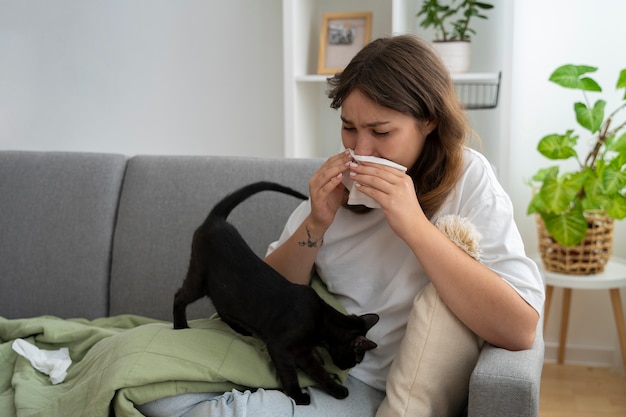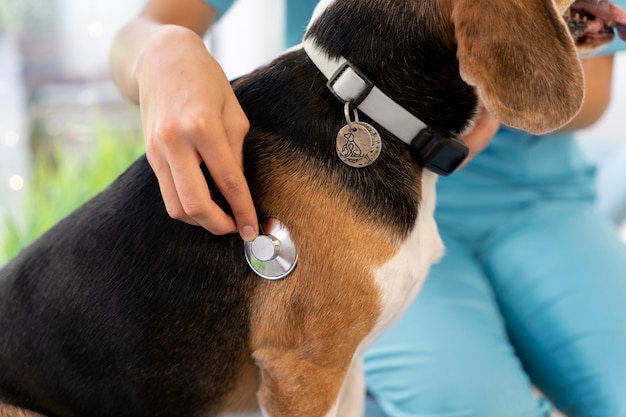Canine Influenza: Understanding Symptoms, Causes, and Treatments


As a pet parent, keeping your furry friend healthy is a top priority. One condition that has gained attention in recent years is canine influenza, a contagious respiratory illness that can affect dogs of all ages. Understanding the symptoms, causes, and treatments for canine influenza is crucial for ensuring your dog’s well-being and preventing the spread of this virus.
At PetVet Animal Hospital, we’re dedicated to providing you with the information you need to protect your beloved pet. In this blog, we will delve into the details of canine influenza, helping you recognize the signs and take appropriate action if your dog shows symptoms.
What Is Canine Influenza?
Canine influenza is caused by the canine influenza virus (CIV), which belongs to the influenza A virus family. There are two main strains of this virus: H3N8 and H3N2. Both strains are highly contagious and can spread rapidly among dogs, particularly in environments where many dogs congregate, such as boarding facilities, dog parks, and shelters.
While canine influenza primarily affects dogs, it is important to note that it is not transmissible to humans. However, the symptoms can be quite severe, and in some cases, it can lead to pneumonia or other serious respiratory conditions if left untreated.
Symptoms of Canine Influenza
Recognizing the symptoms of canine influenza is essential for prompt diagnosis and treatment. The signs of this illness can vary, but common symptoms include:
- A persistent cough that may sound honking
- Nasal discharge, which may be clear or greenish
- Watery eyes
- Fever, which can range from mild to high
- Loss of appetite
- Lethargy or decreased activity level
- Difficulty breathing or rapid breathing
Some dogs may show mild symptoms, while others may develop severe respiratory issues. If you notice any of these signs in your dog, it’s essential to contact PetVet Animal Hospital for an evaluation.
Causes of Canine Influenza
Canine influenza is primarily spread through respiratory secretions, such as coughs and sneezes. The virus can also survive on surfaces and objects, including food bowls, toys, and clothing. If your dog comes into contact with an infected dog or contaminated surfaces, they may contract the virus.
Certain factors can increase the risk of your dog contracting canine influenza. These include:
- Close proximity to other dogs in crowded environments
- Exposure to infected dogs during outings or playdates
- Lack of vaccination against canine influenza
Diagnosis of Canine Influenza
If your dog exhibits symptoms of canine influenza, a visit to PetVet Animal Hospital is essential. During the appointment, our veterinarians will conduct a thorough examination, which may include:
- Reviewing your dog’s medical history
- Performing a physical examination
- Conducting laboratory tests, such as PCR testing or serology, to confirm the presence of the virus
Early diagnosis is crucial for effective treatment, so don’t hesitate to seek veterinary care if you suspect your dog may be ill.
Treatment Options for Canine Influenza
Treatment for canine influenza primarily focuses on managing symptoms and supporting your dog’s recovery. Depending on the severity of the illness, treatment may include:
- Rest and isolation from other dogs to prevent the spread of the virus
- Fluid therapy to prevent dehydration
- Cough suppressants or anti-inflammatory medications to relieve symptoms
- Antibiotics, if a secondary bacterial infection is present
Most dogs recover from canine influenza within two to three weeks with proper care. However, it is essential to monitor your dog’s condition closely and follow your veterinarian’s recommendations for treatment.
Prevention of Canine Influenza
Preventing canine influenza is the best way to protect your dog. Vaccination is available for both strains of the virus and is recommended for dogs at higher risk, such as those in communal settings. Additionally, practicing good hygiene, such as regularly cleaning your dog’s toys and avoiding contact with sick dogs, can help reduce the risk of infection.
If you suspect your dog may have canine influenza or want to learn more about vaccination options, contact PetVet Animal Hospital today at (317) 792-8919 or visit us at 14065 Mundy Dr,Fishers, IN 46038. Our experienced team is here to provide the care and support your pet needs to stay healthy and happy!



















